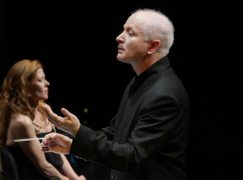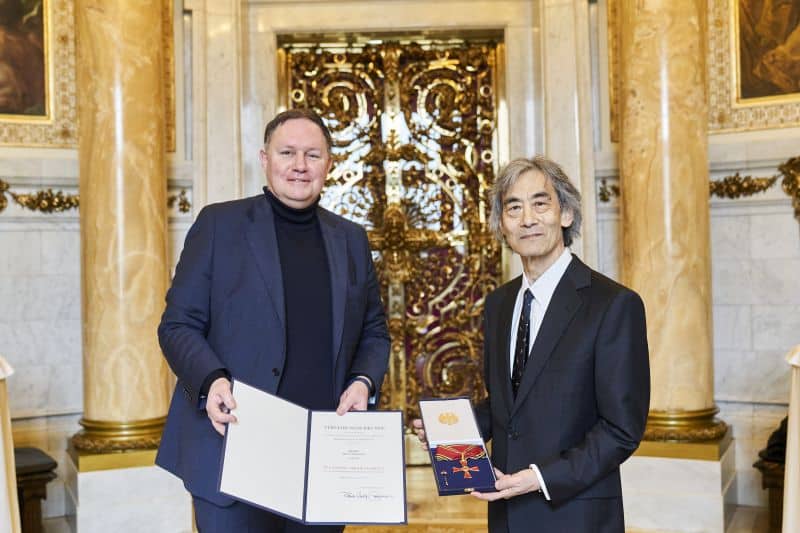Barbara Hannigan responds to cool Covent Garden reviews
mainThe soprano has asked us to feature her response to our summary of below-tepid reviews of George Benjamin’s Lessons in Love and Violence:
Dear Norman, I cannot understand how or why you have in good conscience used a title like this for your post on George Benjamin’s new opera. Were you there on opening night? I was there! After being a part of over 80 world premieres, I can tell you, the audience reception was the opposite of cool. It had a delicious temperature! And regarding your press selections, the opera has garnered mostly 4 star reviews save for a few. The New York Times review from Anthony Tommassini was extraordinary! Of course I am personally biased, as I have been a part of this piece and other works of George Benjamin for many years, but it is not my personal feeling about this piece which prompts me to write this note to your website. It is that you have put a negative spin, unfairly, on a piece which deservedly received positive attention from most of the press and from the audience. And, in the bigger picture, you have put a negative light onto something which should be celebrated, no matter what. Composers need to be supported. Their work is courageous and they are isolated for years of their lives, writing MUSIC. Composers are rarely understood or celebrated. Sometimes they succeed and sometimes they are less successful but they have, as another composer I admire very much has said, “put their DNA on a slide, under a microscope” and have dared to allow it to be seen, heard, and judged. They are not remaining anonymous, like much of the cowardly commentary we see on internet sites. The night after opening, for you to write a title like this to a post…well, I find it an unnecessarily negative. More love please, less violence.

photo Stephen Cummiskey/ROH
Dear Barbara
Thank you for your response. I chose not to attend George Benjamin’s new opera since I emerged wholly alienated from Written on Skin and would not have approached this work in my usual spirit of hopeful expectation. Several critics – notably Rupert Christiansen in the Telegraph yesterday and Richard Morrison in the Times this morning – appear to have been alienated in much the same way by the new opera.
You are right to point out that the first-night audience received it with enthusiasm. It may well be that there is a definite appetite for opera that avoids emotional engagement. Who knows? Time alone will tell. best wishes, Norman






Never, ever get into it with critics. Even under the guise of support for a new work.
BTW, Written in Skin is a masterpiece. My wife, however, agrees with you, Norman. And never, ever get into it with your wife!
I was almost fired after expressing my enthusiasm about the Skinwriting piece, wanted to set a couple of very visible tattoos (and one less visible), but announcing my intention let loose a storm of conflict in the house which involved the family and rest of the staff as well. Mostly mine happened to be a minority standpoint, well, that’s what you get when you want to be progressive! Who’s looking for emiotional engagement in opera??!! Silly idea! that’s for sentimental old fogeys who want to keep their sentimental past intact. New opera is about the future when we have overcome all such things.
Sally
Another proof of all these egomaniacs (composers / performers) need us (audience / critics) more than we need them.
Why are you interested in opera at all, if that’s how you feel about both composers and performers?
Ditto!
Well said Barbara. Couldn’t agree more.
I respect Hannigan and believe she has genuine talent, but I will disagree with the idea that new art should be celebrated and artists supported no matter what. Art should be judged on its merits and if someone finds it wanting they should be free to say so. No one should say that Benjamin, or any other serious artist, should not be producing their art, but we should also be free to say if we don’t like it. I personally like some of Benjamin’s instrumental music, but what I have heard of Written on Skin held little aesthetic appeal.
Still, I am glad that Hannigan is standing up for what she believes, and that she is more committed to new music than most of her peers are.
The reason of what is observed in that last sentence, is the cultural gap between audiences educated on existing musical repertoire and composers writing on the basis of rejecting the fundaments of the art form. Prokofiev’s and Shostakovich’s operas were quite new in the West when they began to be performed here, but they entered the regular repertoire because they did not violate the means of communication which have been the basis of opera from 1600 onwards.
Hear hear!!
A critic criticizing something he/she hasn’t seen/heard is called “ prejudice” !
If you’re relying on Christiansen and Morrison to support your position, you are really clutching at straws.
As for your claim that the opera ‘avoids emotional engagement’, quite apart from the fact that you haven’t actually seen it, I would suggest that anyone with a degree of emotional maturity could not fail to be emotionally engaged by it.
Er…I disagree. If Norman didn’t find it engaging, there is nothing wrong with him saying so. All he can do is talk about his experience. A good critic can explain why they felt a certain way about a piece.
And for the new piece, he has been clear he didn’t attend since he thought he wouldn’t like it. And he explained why.
Of course, you can feel differently about these operas. But you shouldn’t think your response is the only way one can experience these works. And that others who don’t respond as you do are somehow deficient or perfidious.
Oh, and another thing. Ms Hannigan was not responding to ‘cool’ or ‘below tepid’ reviews. She was responding to your attempt to put a negative spin on what were (usual suspects apart) broadly positive to very positive reviews. Your further spin on her response does you no credit. In the light of your recent clickbait headlines re Kristine Opolais, Jennifer Davis and Bayreuth’s ‘boycott’, it is perfectly apparent that you are quite wretched.
The headline on this post is disingenuous. As Hannigan’s correspondence makes clear, she was responding to your take on the reviews, Norman – not the press reviews themselves.
There is a large difference between (1) griping about reviews by those in attendance (which were not especially unfavourable, I might add) and (2) criticising axe-grinding spin by somebody who was not in attendance.
Hannigan was clearly doing the latter. It is churlish and telling that you are trying to pretend she was doing the former.
I was going to say this. In addition, in his title Norman tried to reinforce his spin by characterizing once again the reviews as “cool”, the very spin Hannigan sought to object.
No, Hannigan did not respond to reviews, and no, the reviews are not “cool” unless you are determined to ignore all the warm ones, which seem to be the majority.
With all due respect, BH shouldn’t have written this. Her body of work is deservedly celebrated and speaks for itself without the need to defend it against one critc’ s review.
It always surprises me that well-known musicians read and respond to this site. How influential is this site? Do they read this site only if it’s about them? Do they respond only when it’s negative about them? I’ve seen that all of them seem to use this site to defend a friend or themselves. I’ve seen that the NYT from time to time would cite this site as an example of what people are saying on social media. Many famous musicians respond to this site because it’s the very few sites that freely print their response; I can’t imagine the NYT or the Telegraph or the Times just allow all musicians to respond to their reviews.
That kind of language on here is insulting and offensive – and unnecessary. You can criticise a point of view or whatever, but to call someone that when you wouldn’t dream of doing it to their face is gutter stuff.
Indeed.
And about presence: most people nowadays have not experienced WW II. Are they not allowed an opinion about it?
On the basis of your dislike of Written on the Skin you put a negative spin on reviews of something you have not seen. This is a totally disgraceful action and Ms Hannigan is perfectly right to give her temperate response. Morrison’s review was certainly negative he, like you, seemed to have prejudged what he saw, although in his case he at least had bothered to turn up. Rupert Christianen’s review was certainly not the hatchet job you suggest. Had you deigned to attend and had written a negative review at least we would have been able to say that you like the rest of us are entitled to your opinion. As it is, your admission that you have not seen the work in question leads, yet again, to the conclusion that any stick is suitable to beat something, or someone, who falls foul of your prejudices.
For different reasons, and in different ways, I admire both Barbara Hannigan and Norman Lebrecht. As a performer and composer, however, Hannigan’s comments are the ones that resonate with me. Working with contemporary music is an uphill struggle at the best of times. Barbara H. does it to a quality level that is out of the planet and with a commitment that fills me with joy and pride in the profession. In the creative world the success of one is the success of all. Everyone who is in the business of creating and supporting (or slaughtering, as critics often enjoy doing) new musical creations would do well to read Slonimski’s “Lexicon of musical invective” and put matters in perspective.
Agreed. Writing music or even, performing it, is like feeding the crocs in the poind.
I read NL’s piece on the critical response to ‘Lessons in Love and Violence’ and was saddened to learn that the opera had mostly been given the thumbs down. Later I went online and read the reviews and was delighted and surprised that they were almost all very positive. Personally, I couldn’t care less what NL thinks about any new opera, but he should not twist facts to fit his prejudices. I’m seeing the opera next Saturday and am looking forward to it because I thought ‘Written On Skin’ was both compelling and emotionally engaging. Rather than write to NL Barbara Hannigan should wait her opportunity and then throw a glass of wine over him, as Anne Evans did over Tom Sutcliffe.
“Personally, I couldn’t care less what NL thinks about any new opera, but he should not twist facts to fit his prejudices.” But it is his blog and he twists facts all the time to suit his agenda. It takes a lot of imagination to come up with some of the misleading titles NL chooses for his stories. Consider his persistent anti-Met Opera bias. There is journalism here, but as with all journalists, there is a bit of P. T. Barnum as well (with apologies to Barnum).
I think it is just that Norman is a bit careless about how to present news material, and chooses for the most colourful formulation that comes to mind, knowing that this will attract comments, corrections, agreement, critique, further information, etc. etc. and while sometimes the news appears to be biased, the corrections are also published, and all this makes the website lively and fair, and underlines the human side of classical music – which is the reason of its popularity.
For me, this is much ado about nothin’. A non-story all the way around.
I’m no fan of George Benjamin (actually Sir George now, please remember) but even less keen on the prejudice shown in these two threads, as well as the click-bait title.
Come on, SD. You can do better than this !
You’re asking the leopard to change its spots.
The work was fabulously reviewed in the New York Times. Maybe we need some new UK music critics with a fresher approach…
It seems unfair to review something poorly (albeit by rounding up selected quotes from other ageing critics) without having taken the trouble to attend.
https://www.nytimes.com/2018/05/11/arts/music/review-lessons-love-violence-george-benjamin.html
New York has to uphold an identity profile of progressiveness, over the last hundred years. You don’t give that up quickly after such a long time.
When a critic lambastes a piece he hasn’t bothered to even see, it is time to cut that critic from my timeline. ADIOS NL.
I suppose I, like many posters here, get a bit uptight when NL writes something with which I disagree or another poster dislikes what I write. But for goodness sake, at the end of the day what is this? It’s just a blog. It’s a site where people can express their views whether or not these agree with those of anyone else. So what if NL did not attend the premiere? He opened up a wide-ranging discussion and that surely is of greater benefit to the work in question. Sometimes being provocative can be far more stimulating in encouraging discussion.
I know enough about what Hannigan likes and performs to say this: If she favors it, it has to be trash.This is my opinion regarding her defense of new works only. New music really stinks.
New music really stinks. A bold opinion. But how sad for you.
Much new music ‘stinks’ enough that it doesn’t get played a second or third time. Then again, it’s probably always been that way.
Another misleading title, Norman.
She’s not responding to ‘cool reviews’, she’s responding to your purposefully selective choice of reviews, confirming your own prejudged biases.
How a blog pronouncing itself to be ‘the world’s most-read cultural website’ can admit to avoiding attending one of the biggest opera premieres of 2018 is baffling.
It’s not baffling at all: I never go to things I likely to dislike. Barbara Hannigan, by the way, has thanked for this report.
==I never go to things I’m likely to dislike
Bernard Levin was like this. In a column he once wrote that he’d declined going to review some kitchen sink drama production saying he wanted to stay home because he’d “just bought some new curtains”
The difference between Bernard Levin and our Norm is that Levin, however frustratingly contrary he was, was a genius possessed of absolute integrity. Whereas our Norm…
For myself, as I have aged into my 60s, I find I have limited tolerance for things I expect to dislike and, so, like Norman, avoid them. And yet, and yet. Yesterday I went to a concert of four concertos by György Ligeti at the Queen Elizabeth Hall; I went reluctantly and only because a friend had a spare ticket. I didn’t know any of the works, and it was a revelation and I relished every second of it. It was a reminder that sometimes it’s good to take a risk and confound expectations.
I’m glad you enjoyed Ligeti!
Now let’s all imagine that Stephen hadn’t gone to the Ligeti concert, but decided to select the negative reviews (whilst omitting the positive ones) and post them on his blog… It’d be unhelpful, right?
Anyway, I’m looking forward to seeing ‘Lessons in Love and Violence’ this evening!
Apart from the work in question, it is great that the singer defends what she obviously is doing extraordinary well – performing new, still entirely unknown pieces. If you consider the amount of work, emotional and musical investment and time needed for such undertakings, and realize that any performer presenting a new piece in public in fact lies his/her neck on the line, such courage is only to be admired. That does not mean that one should feel inhibited to comment upon the work in question, but in the same time one should admire a performer’s courage and investment. When a performer enters the debate about a new piece, that is only to be welcomed, nothing is more lethal than a bland, conventional reception followed by dead silence. The development of (serious) music depends upon debate and commitment.
Oh sweet Jesus Barbara what rubbish. I have nothing against them, some indeed are very nice people, but there isn’t anything even vaguely heroic about todays’s crop of composers, toiling away dutifully as they do to produce works in one or other of the officially sanctioned stylistic approaches. Try to imagine just for a moment what life is like for a composer who doesn’t conform to that requirement.
The composer who immediatly comes to mind after reading this comment, is R Wagner. There is no other composer in history whose life has been researched more thoroughly and with such contradictory results that people are still fighting over him and his work. And why? 1) because he was highly gifted; and 2) he did not care a [redacted] about what other people ‘expect’ from new music. Indeed much of the ‘established’ new music nowadays seems to be quite bland.
Yes, exactly John. I read your piece on Wagner and whether or not he was a bad person, and felt I had to disagree with a lot of it. But this comment is a great summary, and clearly illustrates why to me (despite his faults although I tire of having to include this disclaimer), Wagner was the very definition of the ‘heroic’ creative artist.
‘Today’s crop of composers’. So you’ve done every living composer the courtesy of listening to their work, and have reached the (frankly barely comprehensible) generalised conclusion above on that basis, have you? Of do you just like old music? Don’t get me wrong: I like old music too.
Not to take this discussion in a strange direction, but I was going to comment earlier when someone said that “new music really stinks”. Now we get the term “old music”. Feels like these terms of “old” and “new” lack a consensus definition. Some think of the Rite of Spring as “new” even though it was written over a hundred years ago. Somewhere in this thread there is a mention of Ligeti. I don’t consider Ligeti “new” music. Heck, I was introduced to his works in the 1960s. New would be Abrahamsen’s 4th string quartet from 2012 or Andriessen’s Theatre of the World from 2016. And that’s just the letter A. Yes, I like old music as well but I am always listening to new music as well.
Completely the right direction, Stuart. The question is, always, in relation to anything you hear: ‘is it good music?’ And that is (in most cases at least) bound to involve an element of subjectivity. The issue highlighted here is that some people are prepared to write off a composer’s operatic work simply on the basis that they didn’t like one of his operas (Norman Lebrecht) or indeed to write off all new music on the basis of a generalisation about ‘today’s crop of composers.’ Of course there are other issues too: the tendency of sone of the established UK critics to enter the auditorium with their arms folded and an ‘impress me’ look on their faces; their reviews which appear to be designed to draw attention to their own soi-disant wit at the expense of the work reviewed (contrast Mr Morrison in The Times with Mr Tommasini in the New York Times, for example.
But the main issue here is, and remains, Mr Lebrecht’s misleading spin and apparent prejudice.
Music which is rooted in the communicative means of tonality and which is inspired, and well-made, does not age, because music only exists in its performance (scores merely being collections of instruction). That music expires immediately after the last note is played, assures its rebirth, and thus good music is contemporary forever. The difficulty is all the things around music, its theory, academia, fashion, reception modes, audience types, marketing, etc. etc. – all things which are not the music itself, including notions of ‘new’ and ‘old’. When Monteverdi was exhumed in the last century, it was new, and his works have become part of the regular repertoire. It is the ‘inside’ of the music which defines its qualities, not the wrapping paper.
Beautifully and eloquently put. Any thoughts on when we can expect our learned authorities to wake up to this reality?
+1
As for GB. He gets a massive slice of the cake in relation to composers of equal/greater merit. Of considerable gifts, he was stymied by early success.
No harm whatsoever in highlighting the bundle of negative reviews/comments.
+1 was for Rog’s common sense retort to that nonsense about ‘today’s crop of composers’
Fascinating. Music has emerged blinking from decades in which one particular school of thought has rigidly controlled the propagation of ideas, at best speaking proxy for any perceived opposition before declaring themselves winners by overwhelming margin, into this bright sunlit world that would provide the opportunity for the free exchange of ideas, if we were not so bereft of the skills required for serious debate.
I know you are a most intelligent person Hilary but you have lived way too long with the accepted truths. This trait is perhaps best illustrated by the bizarre answer to one of the opening questions of that Copland interview you shared a while back. James Day asks Copland why he would not write music in the language of 17th, 18th and 19th centuries, to which the composer replies “Why would I restrict myself to the musical vocabulary of the 18th century when…” (he goes on to list composers who have expanded the possibilities).
Copland has completely ignored the actual question (which would have necessitated a very revealing answer), made up his own one, and answered that instead. Very politician-like. “Why would I restrict myself when I can… restrict myself?”
This is my frustration with the way debate preceeds here. When I say that composers should write for the ears of audiences, rather their own or those of their peers, that simply does not mean in any sense that they should ‘dumb their work down’. Why on earth would you read it that way? The answer has to be simply that that is the interpretation that has attached itself to such statements via years of unquestioned conventional thought. An interpretation that by the way, insults audiences, and that’s really not something we want to be doing.
Likewise it is not so much “today’s crop of composers” that I wish to highlight. Perhaps that was a poor choice of words given that it appears to have drawn your focus. The cause of the full-blown creative crisis in today’s classical music is not that composers write what they are permitted to write, music that they have a realistic prospect of getting performed, it is that those who might have followed a different approach have by and large, simply been forced to walk away.
Step outside of the official guidelines and let me tell you, that’s a whole new world of pain.
That’s perfect Rog. I favour music by composers who express themselves in their own unique creative voice, whatever that may be, even if by doing so they are disobeying their teachers, or defying the expectations of those who so rigidly control what new music actually ends up being heard.
Your definition of new music, I’m afraid, is a very old one. In 2018 new music should be anything it wants to be, as long as it gives voice to a naturally creative gift.
And is written to please the ears of audiences, rather than those of our unaccountable learned authorities.
‘and is written to please the ears of audiences’
A baffling comment. Which audiences exactly? You assume everyone hears music identically.
The course of music history would’ve been rather different had this been the primary aim.
Hilary, the history of music prior to let’s say around about 1920 would not have been any different at all. The notion that composers write only to please themselves and their peers began with Schönberg. It was one of his 2 great gifts to subsequent generations (the other being music by numbers) and came about as a result of his quest to rationalise his lack of popularity. The post-war crew were of course more than grateful for having been passed what was to them, the most convenient of batons.
“In 2018 new music should be anything it wants to be, as long as it gives voice to a naturally creative gift.” That’s a baffling definition of “new music”. Not sure how one would apply it. And the thought that “The notion that composers write only to please themselves and their peers began with Schönberg.” is absurd. I think that some are better equipped to take on the challenges of this music, and those who choose to avoid such music tend to refer to it as “academic” or state that the composer is “writing for himself”. Kind of gets back to the debate if an artist is there to “please” the audience or to “educate” it or “challenge” it. Both can be good. Many of Beethoven’s late works such as the string quartets baffled the audience of the early to mid 1820s, and I am sure he was thought of much as some think of Schoenberg today. Same with Berlioz.
Stuart, just because the late quartets of Beethoven did not initially please the audience does not mean that it was not the composer’s intention to do so. It most certainly was, likewise with the works of Mahler and Bruckner and others who did not receive immediate audience acclaim. That aspiration did not change until Schönberg. I hope now you can see the difference.
No, sorry, I don’t buy it. I suspect there were people in Beethoven’s day who had a notion that the composer was writing only to please himself and his peers. Same with other challenging composers from the 19th century. I was responding to your comment that people only started to have that notion when Schoenberg came along. I understand the difference from your last comment, but still think it wrong. Happy days.
Please Stuart, with respect, either read the comment or don’t reply to it. Thanks.
David, there is no respect in your reply, only contempt for differing views that do not align with your own. Your solution is that one should be censored (“don’t reply”) if they don’t agree with your viewpoint. Welcome to the new progressive age. Your reply to Hilary was pure condescension (“I know you are a most intelligent person…”) No worries, I will stop replying to your posts.
Fair enough Stuart, I have moments where the frustration does just boil over.
I was simply trying to illustrate the difference between a composer’s intentions, and the audience perceptions of his or her intentions.
The first composer on record as having publicly made the claim that the verdict of audiences doesn’t matter, or indeed that a composer’s work was indeed likely to be of more merit if the audience didn’t like it, was Schönberg.
Plenty since have taken this notion and run with it, one particularly well known example being Babbitt, to the extent that up until fairly recently it was seen as almost a universal truth.
Can you imagine a similar attitude prevailing in the restaurant trade? In the world of film or literature? Or for that matter any other field of human endeavour other than this crazy, disfunctional art-form?
Thanks, David, it’s a good response. Totally agree. I was aware of the Babbitt comments. Cheers.
Verdi wrote Falstaff “just to please himself”.
Which is not to say that he didn’t care about how it would be received by audiences once he finished composing the opera. Double negative, sorry, I know.
I dunno, I think Norman is entitled not to go hear something. He makes it sound like he’s heard enough of Benjamin’s music to know he isn’t interested in hearing more.
I feel the same way about Boulez.
It’s not surprising, but still disappointing, that he (apparently) cherry-picked his reviews to make it look like “everybody” gave it the thumbs down. But then again, he makes no secret of the fact that he’s got favorites (St. Mirga), and… whatever is the opposite of favorites (Buniatishvili). So, nothing surprising here, just the usual mild disappointment.
Well, Boulez won’t be troubling you anymore with new compositions.
I think you’re ALL wrong – all of you. Only my opinion matters. I’m the ‘decider’ as to what’s good and what isn’t; well, for me anyway.
– 10,0000
Just factually: so far 3 five star reviews, 8 four star reviews, 2 three star reviews and 1 two star review. Plus two others without star gradings, one of which called it a Towering Masterpiece (Mark Berry). So presumably another 5 five stars.
Personally I loved it: multi-layered and poetic and yet so precise, both in music and libretto.